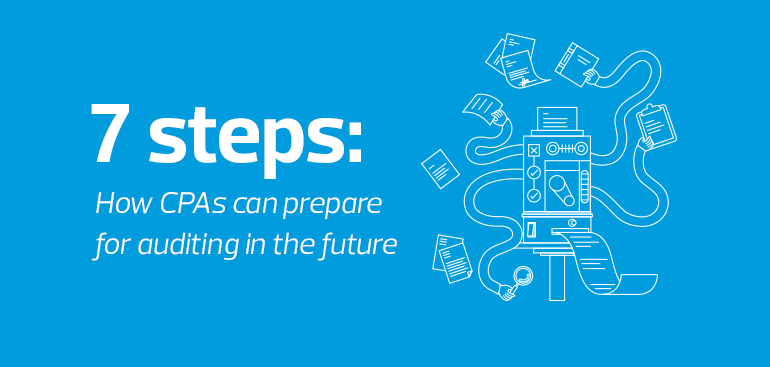
Auditors strive to make confident, precise judgements based on the numbers — but when it comes to forecasting the future of the profession, they can’t exactly be blamed for feeling less assured.
As breakthroughs in artificial intelligence and machine learning continue at a rapid pace, it’s certain that financial technology (or “fintech”) will play a significant role in the auditing profession.
Still, auditors fill one fundamental role that the fastest-counting machines cannot. “If we go back to the Securities Exchange Acts of 1933 and 1934, the franchise we were granted was to provide independent and objective assurance over information others use to make investing decisions,” said Bob Dohrer, CPA, global leader, Quality and Risk, RSM International. “That basic core need or role will not change going into the future, and as long as we can keep our eye on meeting that need, we will continue to maintain a value in helping people.”
Dohrer spoke during an “Auditing in the Future” panel Wednesday at the AICPA Conference on Current SEC and PCAOB Developments in Washington. “The profession itself is playing catch-up, and there are probably quite a few reasons that’s the case,” he said during a preconference telephone interview. “Some are as basic as the auditing standards that were written and developed during an era that didn’t anticipate some of the technology and advances that we’re experiencing today — and our clients have advanced rapidly, so we have to pick up the pace.”
To that end, Dohrer and Will Bible, CPA, a partner and audit innovation leader with Deloitte & Touche LLP, offered seven actionable insights to help auditors understand how they can best assess and address the changes to come:
1. Value your role and what you already know
Dohrer stressed that the auditor’s most fundamental roles will continue to revolve around professional scepticism, staying independent and objective, and using good judgement. To that last attribute, Dohrer said: “Artificial intelligence is wonderful and making great, huge advances, but there’s that call that only we can make: Do I qualify or modify my opinion? At the end of the day it comes down to human experience and the ability to make sound judgements based on that.”
2. Keep an auditor’s eye on the client’s automation
Robotic process automation (RPA) is already revolutionising the workplace, as computers take over clerical chores and accounting tasks many professionals would happily hand off. That said, “clearly, introducing new technology into the reporting process also introduces new risks,” Bible said. “That means auditors need to develop new procedures, and companies need new controls. And you need to test those controls. While our clients may automate routine accounting work, it also makes the task of auditing their systems more challenging.”
3. Take advantage of technology
Auditors themselves can leverage RPA as well. “If I don’t have to spend hours trawling through general ledgers — a task that can be automated through RPA — then the question is, ‘How can I then change to provide added value?’ ” Dohrer said. Look into leveraging data analytics as well. “When a client has millions of transactions, it can be difficult to sample,” Bible said. “Today, we use data analytics to assess big populations and focus on risks.”
4. Get used to exponential, unexpected change
It’s helpful to think of auditing in a digital future as analogeous to Moore’s law, named for Intel co-founder Gordon Moore. Just as Moore contended that integrated circuit power would double every two years, “new technologies are developed much more quickly and it’s not going to slow down,” Bible said. “Digital transformation means that technologies and devices are getting smaller, becoming faster, and expanding across more fronts at once. New types of applications of technology will come out of the woodwork in unexpected ways.”
5. Start small, scale fast, repeat
The auditing profession can learn something from high-tech’s “test and learn” mentality as firms come to grips with creating next-gen auditing systems. “It comes down to continuous innovation: Build small, figure out where things don’t work, and continue to try new things,” Bible said. “And once you find things that work with the technology, you have to scale up — and fast. The days of building an IT system in a backroom to last a decade or two are gone. Over. You have to experiment and see what works. At Deloitte, we’ve embraced this way of thinking about things.”
6. More than ever, stay informed
As fintech changes the auditing landscape, navigating the road ahead means doubling down on learning. “Professions and firms need to commit to continuous education,” Bible said. If you’re looking for great learning resources, check out groups such as the Wall Street Blockchain Alliance — or, as Dohrer said he’s done himself, “go to Google, type in ‘RPA,’ and start reading. There are literally thousands of articles, and many of the professional bodies and institutes are partnering to provide training and seminars.”
7. Keep calm and audit on
Dohrer offered these assuring words: “Don’t panic or think the sky is falling and that auditors and accountants and CPAs will be out of a job and not needed.” As CPAs come to grips with auditing in the future, they’re well-served to remember the profession’s solid past.
“Take a look back over your shoulder and see exactly how it is that we’ve added value: it’s to provide assurance about critical information for making important financial decisions,” Dohrer said. “When people make an important decision with their financial resources — whether it’s personal or with a company they own — they need some independent, objective third party to tell them the information can be relied upon.”
Remember that before auditing in the future comes promise in the present. “It’s an exciting time for us, and we just can’t get intimidated by the changes,” Dohrer said. “We have to accept it, learn about it, and take advantage of it.”
This article was written by Lou Carlozo for the Journal of Accountancy and first appeared on The Journal of Accountancy website on 6 December 2017 here.







